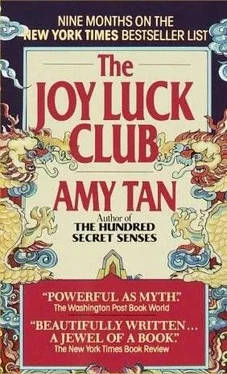"There she is!" cried my mother. Old Mr. Chou smiled at me and waved. I walked up to my mother and saw that she was hovering over something, as if she were tending a baby.
"See," she said, beaming. "I have just planted them this morning, some for you, some for me."
And below the heimongmong , all along the ground, were weeds already spilling out over the edges, running wild in every direction.
Jing-Mei Woo
Five months ago, after a crab dinner celebrating Chinese New Year, my mother gave me my "life's importance," a jade pendant on a gold chain. The pendant was not a piece of jewelry I would have chosen for myself. It was almost the size of my little finger, a mottled green and white color, intricately carved. To me, the whole effect looked wrong: too large, too green, too garishly ornate. I stuffed the necklace in my lacquer box and forgot about it.
But these days, I think about my life's importance. I wonder what it means, because my mother died three months ago, six days before my thirty-sixth birthday. And she's the only person I could have asked, to tell me about life's importance, to help me understand my grief.
I now wear that pendant every day. I think the carvings mean something, because shapes and details, which I never seem to notice until after they're pointed out to me, always mean something to Chinese people. I know I could ask Auntie Lindo, Auntie An-mei, or other Chinese friends, but I also know they would tell me a meaning that is different from what my mother intended. What if they tell me this curving line branching into three oval shapes is a pomegranate and that my mother was wishing me fertility and posterity? What if my mother really meant the carvings were a branch of pears to give me purity and honesty? Or ten-thousand-year droplets from the magic mountain, giving me my life's direction and a thousand years of fame and immortality?
And because I think about this all the time, I always notice other people wearing these same jade pendants-not the flat rectangular medallions or the round white ones with holes in the middle but ones like mine, a two-inch oblong of bright apple green. It's as though we were all sworn to the same secret covenant, so secret we don't even know what we belong to. Last weekend, for example, I saw a bartender wearing one. As I fingered mine, I asked him, "Where'd you get yours?"
"My mother gave it to me," he said.
I asked him why, which is a nosy question that only one Chinese person can ask another; in a crowd of Caucasians, two Chinese people are already like family.
"She gave it to me after I got divorced. I guess my mother's telling me I'm still worth something."
And I knew by the wonder in his voice that he had no idea what the pendant really meant.
At last year's Chinese New Year dinner, my mother had cooked eleven crabs, one crab for each person, plus an extra. She and I had bought them on Stockton Street in Chinatown. We had walked down the steep hill from my parents' flat, which was actually the first floor of a six-unit building they owned on Leavenworth near California. Their place was only six blocks from where I worked as a copywriter for a small ad agency, so two or three times a week I would drop by after work. My mother always had enough food to insist that I stay for dinner.
That year, Chinese New Year fell on a Thursday, so I got off work early to help my mother shop. My mother was seventyone, but she still walked briskly along, her small body straight and purposeful, carrying a colorful flowery plastic bag. I dragged the metal shopping cart behind.
Every time I went with her to Chinatown, she pointed out other Chinese women her age. " Hong Kong ladies," she said, eyeing two finely dressed women in long, dark mink coats and perfect black hairdos. "Cantonese, village people," she whispered as we passed women in knitted caps, bent over in layers of padded tops and men's vests. And my mother-wearing lightblue polyester pants, a red sweater, and a child's green down jacket-she didn't look like anybody else. She had come here in 1949, at the end of a long journey that started in Kweilin in 1944; she had gone north to Chungking, where she met my father, and then they went southeast to Shanghai and fled farther south to Hong Kong, where the boat departed for San Francisco. My mother came from many different directions.
And now she was huffing complaints in rhythm to her walk downhill. "Even you don't want them, you stuck," she said. She was fuming again about the tenants who lived on the second floor. Two years ago, she had tried to evict them on the pretext that relatives from China were coming to live there. But the couple saw through her ruse to get around rent control. They said they wouldn't budge until she produced the relatives. And after that I had to listen to her recount every new injustice this couple inflicted on her.
My mother said the gray-haired man put too many bags in the garbage cans: "Cost me extra."
And the woman, a very elegant artist type with blond hair, had supposedly painted the apartment in terrible red and green colors. "Awful," moaned my mother. "And they take bath, two three times every day. Running the water, running, running, running, never stop!"
"Last week," she said, growing angrier at each step, "the waigoren accuse me." She referred to all Caucasians as waigoren , foreigners. "They say I put poison in a fish, kill that cat."
"What cat?" I asked, even though I knew exactly which one she was talking about. I had seen that cat many times. It was a big one-eared tom with gray stripes who had learned to jump on the outside sill of my mother's kitchen window. My mother would stand on her tiptoes and bang the kitchen window to scare the cat away. And the cat would stand his ground, hissing back in response to her shouts.
"That cat always raising his tail to put a stink on my door," complained my mother.
I once saw her chase him from her stairwell with a pot of boiling water. I was tempted to ask if she really had put poison in a fish, but I had learned never to take sides against my mother.
"So what happened to that cat?" I asked.
"That cat gone! Disappear!" She threw her hands in the air and smiled, looking pleased for a moment before the scowl came back. "And that man, he raise his hand like this, show me his ugly fist and call me worst Fukien landlady. I not from Fukien. Hunh! He know nothing!" she said, satisfied she had put him in his place.
On Stockton Street, we wandered from one fish store to another, looking for the liveliest crabs.
"Don't get a dead one," warned my mother in Chinese. "Even a beggar won't eat a dead one."
I poked the crabs with a pencil to see how feisty they were. If a crab grabbed on, I lifted it out and into a plastic sack. I lifted one crab this way, only to find one of its legs had been clamped onto by another crab. In the brief tug-of-war, my crab lost a limb.
"Put it back," whispered my mother. "A missing leg is a bad sign on Chinese New Year."
But a man in a white smock came up to us. He started talking loudly to my mother in Cantonese, and my mother, who spoke Cantonese so poorly it sounded just like her Mandarin, was talking loudly back, pointing to the crab and its missing leg. And after more sharp words, that crab and its leg were put into our sack.
"Doesn't matter," said my mother. "This number eleven, extra one."
Back home, my mother unwrapped the crabs from their newspaper liners and then dumped them into a sinkful of cold water. She brought out her old wooden board and cleaver, then chopped the ginger and scallions, and poured soy sauce and sesame oil into a shallow dish. The kitchen smelled of wet newspapers and Chinese fragrances.
Then, one by one, she grabbed the crabs by their back, hoisted them out of the sink and shook them dry and awake. The crabs flexed their legs in midair between sink and stove. She stacked the crabs in a multileveled steamer that sat over two burners on the stove, put a lid on top, and lit the burners. I couldn't bear to watch so I went into the dining room.
Читать дальше












